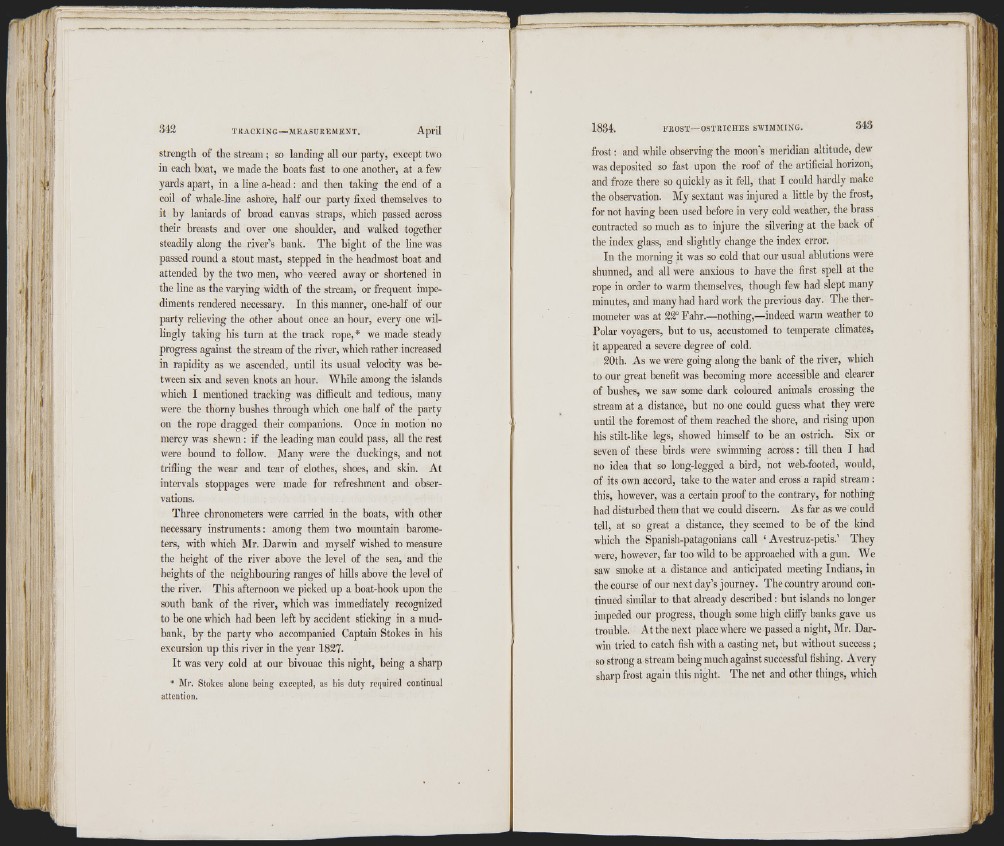
m-I J
<1
■ * il'
7 ' «
7l
(j
Jil!
M i
342 TRACKING—MEASDIIEMENT. April
Strength of the stream ; so landing all our party, except two
in each boat, we made the boats fast to one another, at a few
yards apart, in a line a-head; and then taking the end of a
coil of whale-line ashore, half our party fixed themselves to
it by laniards of broad canvas straps, which passed across
their breasts and over one shoulder, and walked together
steadily along the river’s bank. The bight of the line was
passed round a stout mast, stepped in the headmost boat and
attended by the two men, who veered away or shortened in
the line as the varying width of the stream, or frequent impediments
rendered necessary. In this manner, one-half of our
party relieving the other ahout once an hour, every one willingly
taking his turn at the track rope,* we made steady
progress against the stream of the river, which rather increased
in rapidity as we ascended, until its usual velocity was between
six and seven knots an hour. While among the islands
which I mentioned tracking was difficult and tedious, many
were the thorny bushes through which one half of the party
on the rope dragged their companions. Once in motion no
mercy was shewn : if the leading man could pass, all the rest
were bound to follow. Many were the duckings, and not
trifling the wear and tear of clothes, shoes, and skin. At
intervals stoppages were made for refreshment and observations.
Three chronometers were carried in the boats, with other
necessary instruments: among them two mountain barometers,
with which Mr. Darwin and myself wished to measure
the height of the river above the level of the sea, and the
heights of the neighbouring ranges of hills above the level of
the river. This afternoon we picked up a boat-hook upon the
south bank of the river, which was immediately recognized
to be one which had been left by accident sticking in a mud-
bank, by the party who accompanied Captain Stokes in his
excursion up this river in the year 1827.
It was very cold at our bivouac this night, being a sharp
* Mr. Stokes alone being excepted, as his duty required continual
attention.
1834. FEOST— OSTRICHES SWIMMING. 843
frost; and while observing the moon’s meridian altitude, dew
was deposited so fast upon the roof of the artificial horizon,
and froze there so quickly as it fell, that I could hardly make
the observation. My sextant was injured a little by the frost,
for not having been used before in very cold weather, the brass
contracted so much as to injure the silvering at the back of
the index glass, and slightly change the index error.
In the morning it was so cold that our usual ablutions were
shunned, and all were anxious to have the first spell at the
rope in order to warm themselves, though few had slept many
minutes, and many had hard work the previous day. The thermometer
was at 22° Fahr.—nothing,—indeed warm weather to
Polar voyagers, but to us, accustomed to temperate climates,
it appeared a severe degree of cold.
20th. As we were going along the bank of the river, which
to our great benefit was becoming more accessible and clearer
of bushes, we saw some dark coloured animals crossing the
stream at a distance, but no one could guess what they were
until the foremost of them reached the shore, and rising upon
his stilt-like legs, showed himself to be an ostrich. Six or
seven of these birds were swimming across : till then I had
no idea that so long-legged a bird, not web-footed, would,
of its own accord, take to the water and cross a rapid stream :
this, however, was a certain proof to the contrary, for nothing
had disturbed them that we could discern. As far as we could
tell, at so great a distance, they seemed to be of the kind
which the Spanish-patagonians call ‘ Avestruz-petis.’ They
were, however, far too wild to be approached with a gun. We
saw smoke at a distance and anticipated meeting Indians, in
the course of our next day’s journey. The country around continued
similar to that already described: but islands no longer
impeded our progress, though some high cliffy banks gave us
trouble. At the next place where we passed a night, Mr. Darwin
tried to catch fish with a casting net, but without success ;
so strong a stream being much against successful fishing. Avery
sharp frost again this night. The net and other things, which
Ì I